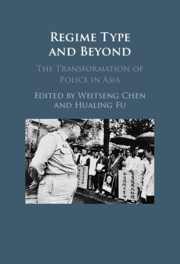Book contents
- Regime Type and Beyond
- Regime Type and Beyond
- Copyright page
- Contents
- Figures
- Tables
- Contributors
- Abbreviations
- Part I Framework
- Part II Authoritarian Policing: Past and Present
- Part III Democratic Transition and Authoritarian Resilience
- Part IV The Singapore and Hong Kong Exceptions
- 11 Democratic Policing in an Authoritarian State?
- 12 Empires Collaborate
- 13 The End of Soft-Style Protest Policing in a Hybrid Regime
- Part V Conclusions
- Index
13 - The End of Soft-Style Protest Policing in a Hybrid Regime
Evidence from Hong Kong1
from Part IV - The Singapore and Hong Kong Exceptions
Published online by Cambridge University Press: 25 May 2023
- Regime Type and Beyond
- Regime Type and Beyond
- Copyright page
- Contents
- Figures
- Tables
- Contributors
- Abbreviations
- Part I Framework
- Part II Authoritarian Policing: Past and Present
- Part III Democratic Transition and Authoritarian Resilience
- Part IV The Singapore and Hong Kong Exceptions
- 11 Democratic Policing in an Authoritarian State?
- 12 Empires Collaborate
- 13 The End of Soft-Style Protest Policing in a Hybrid Regime
- Part V Conclusions
- Index
Summary
Using interview data from protesters and frontline police, this chapter examines the transition of protest policing, from soft to hard models, amid the recent unrest in Hong Kong. While police-centric explanations in the protest policing literature view police as intentional decision-makers who can choose from a variety of policing strategies, we employ a mixed-embeddedness framework that reveals a number of factors—external to police—that have deprived the Hong Kong Police Force of its capacity to facilitate peaceful protest through soft strategies of communication and negotiation. These include, (1) a legitimacy crisis of governance in Hong Kong (a macrolevel factor), (2) the erosion of police authority within the local political culture (a mesolevel factor), and (3) stylistic changes in police–protester interactions, involving the increased use of masks and collective action frames of identification as victims of police (microlevel factors). Together, these factors inaugurated reaction spirals that led to the end of soft, facilitative protest-policing in Hong Kong.
Keywords
- Type
- Chapter
- Information
- Regime Type and BeyondThe Transformation of Police in Asia, pp. 316 - 342Publisher: Cambridge University PressPrint publication year: 2023



